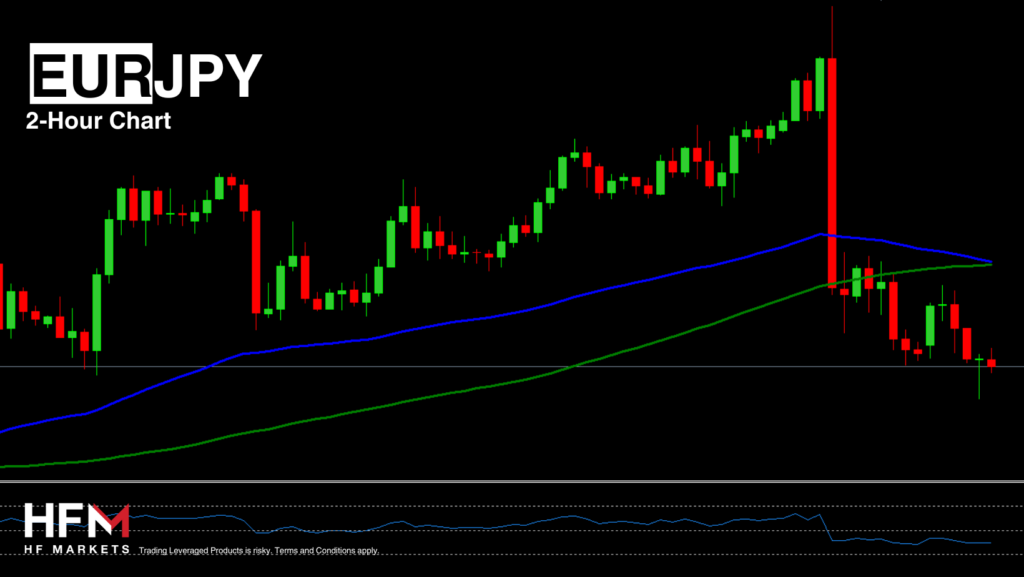
- Asian stocks rise on Monday after China’s PMI data rises to a 6-month high, lowering the risk of stagnation.
- On Friday, the Japanese Yen rose more than 1.80% as the Bank of Japan advised more rate hikes are possible.
- Gold and the Japanese Yen increase as the US Dollar again is on the back-foot. Geo-political tensions continue to support Gold and the Yen.
- Japan’s new Prime Minister, Shigeru Ishiba, emphasizes the need to combat deflation and to boost wages.
EURJPY – More BOJ Rate Hikes & More Support For Wages!
Investors are increasing their exposure to the Japanese Yen for 3 reasons. The first is that the Bank of Japan is one of the only Central Banks globally which will not be cutting interest rates in 2024. The second is that the Bank of Japan is likely to again increase interest rates as the new Prime Minister looks to confirm new measures to increase wages. The last reason is investors attempting to limit the risks of lowering interest rates.
 EURJPY 2-Hour Chart on October 30th
EURJPY 2-Hour Chart on October 30th
The worst performing currencies of September have been the US Dollar and the Euro due to the banks’ decisions to cut larger than previous expectations. In addition to this, the European economy continues to show signs of another shallow recession which will prompt the European Central Bank to continue cutting. According to analysts, the ECB is likely to again cut rates in October but will opt to pause in December.
In September, the Tokyo area’s CPI dropped from 2.6% to 2.2%, and the core CPI fell from 2.4% to 2.0% year-on-year, aligning with the Bank of Japan’s goal of steadying inflation, which raises the possibility of tighter monetary policy. On Friday, Shigeru Ishiba was elected as the new leader of Japan’s Liberal Democratic Party and will become Prime Minister. In a press conference, he stated the need to combat deflation and pledged to take steps to raise wages.
If wages do indeed rise, the Bank of Japan will see this as the required leeway to increase interest rates again. So far the BOJ’s interest rate has risen from -0.10% to 0.25%. The Japanese Yen is one of the better performing currencies of the day, only declining against the New Zealand Dollar. However, investors will need to be cautious about any changes in price action as the Asian Session ends.
The price of the Euro will largely depend on the German inflation rate which will be released throughout the day. Germany’s current inflation rate stands at 1.9%, 0.6% lower than January 2024. Analysts expect Germany’s monthly Consumer Price Index to read 0.1% but if it is lower the Euro can again decline. A lower inflation rate will indicate a weakening economy and provide further data for the ECB to cut further.
So how will the EURJPY develop over the upcoming week?
Since the Japanese Yen rose by 1.89% on Friday, the exchange rate fell below the trendline and average price. The asset is also trading comfortably below the neutral area of the Oscillator. These factors indicate that the momentum is with the Japanese Yen and “sellers” are controlling the market. Individuals looking to speculate the bearish price trend may look to aim for the 157.483 level which is a previous resistance level or the 155.471 level which is the most recent support level. However, this will depend on if investors are looking to speculate in the medium or short term. On the 5-minute timeframe, the price is retracing by 0.29%, but if the price drops again below 158.260, momentum will again support the Japanese Yen.
Lastly, investors should be aware that while the Japanese Yen is gaining momentum, the upcoming trading session will hinge on the German inflation rate.
Click here to access our Webinar Schedule
Michalis Efthymiou
Market Analyst
Disclaimer: This material is provided as a general marketing communication for information purposes only and does not constitute an independent investment research. Nothing in this communication contains, or should be considered as containing, an investment advice or an investment recommendation or a solicitation for the purpose of buying or selling of any financial instrument. All information provided is gathered from reputable sources and any information containing an indication of past performance is not a guarantee or reliable indicator of future performance. Users acknowledge that any investment in Leveraged Products is characterized by a certain degree of uncertainty and that any investment of this nature involves a high level of risk for which the users are solely responsible and liable. We assume no liability for any loss arising from any investment made based on the information provided in this communication. This communication must not be reproduced or further distributed without our prior written permission.


















